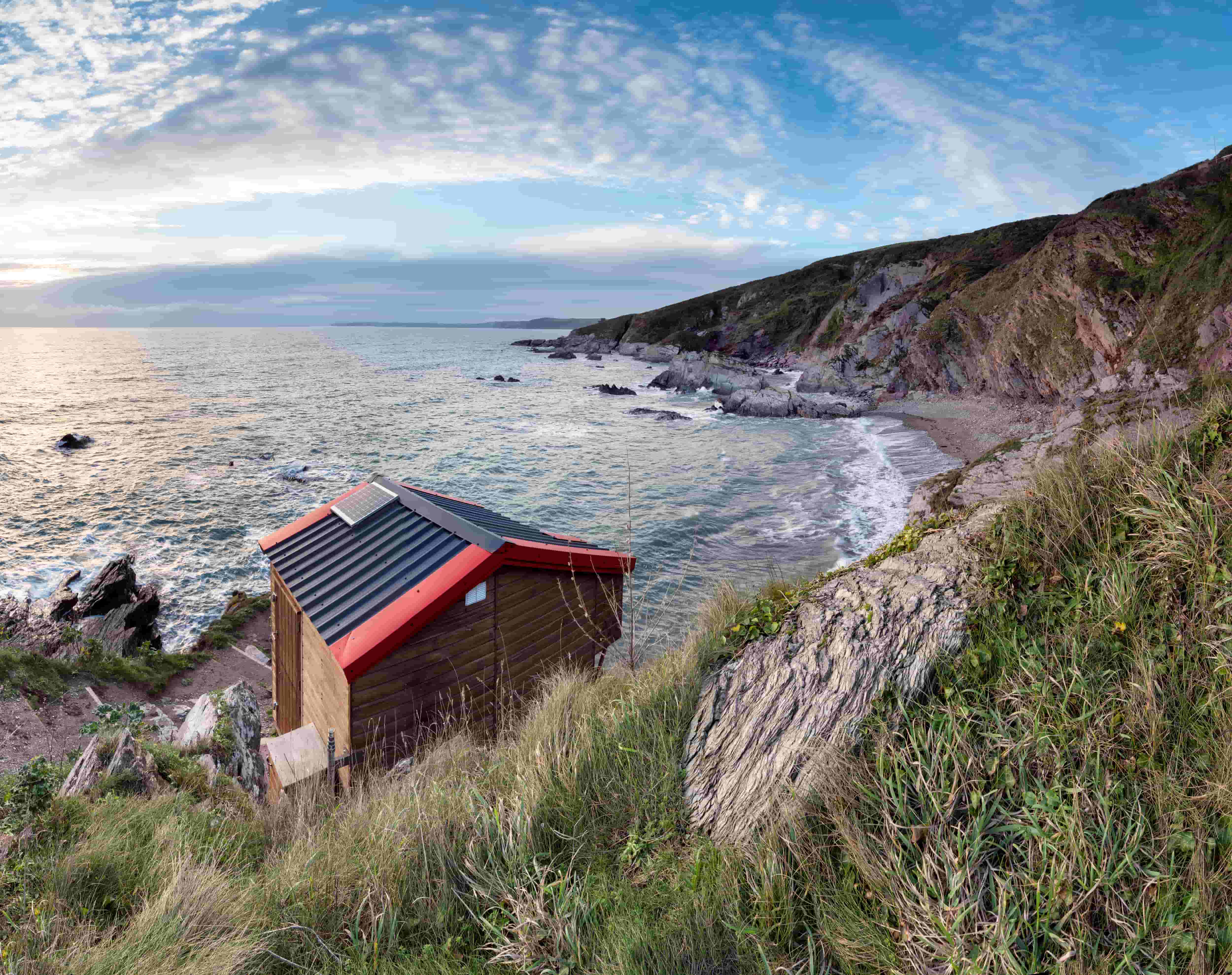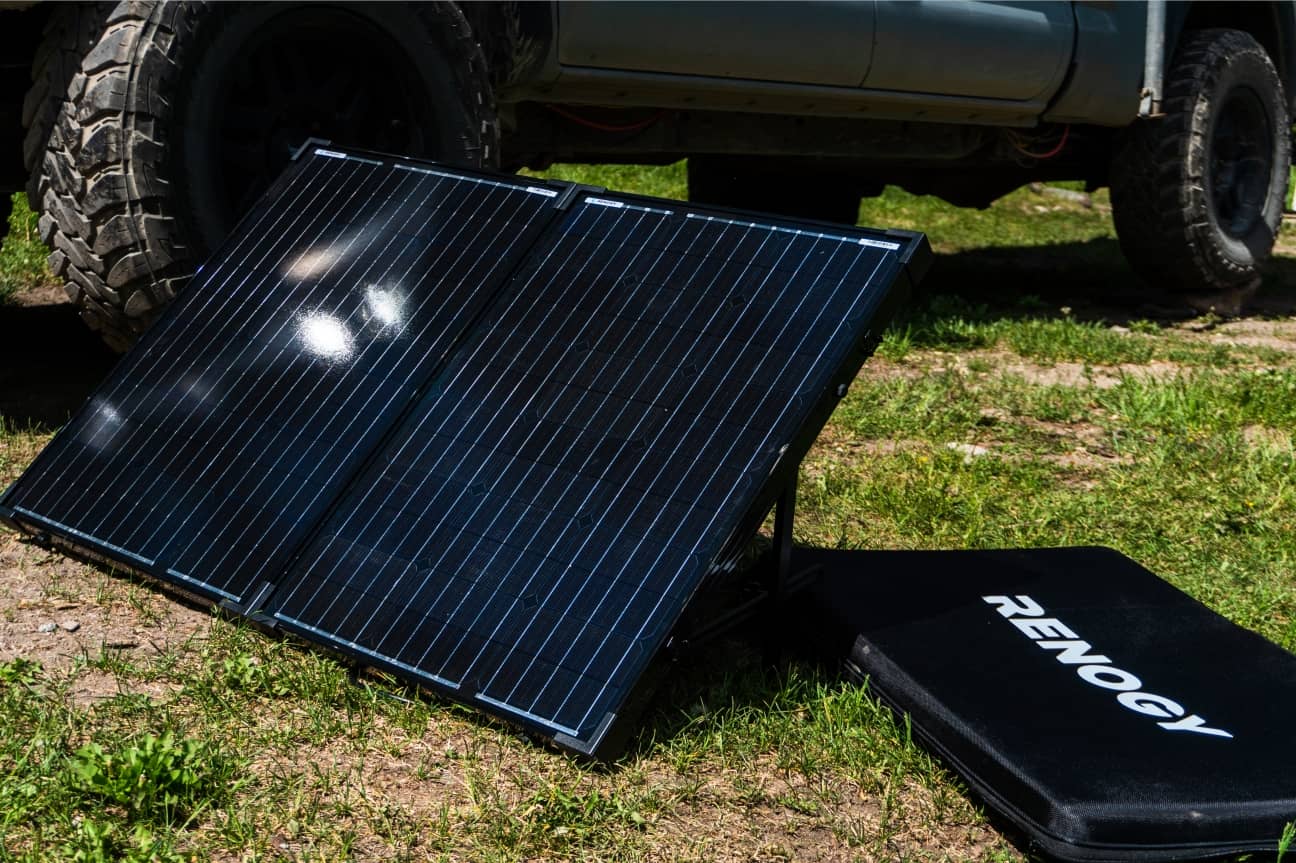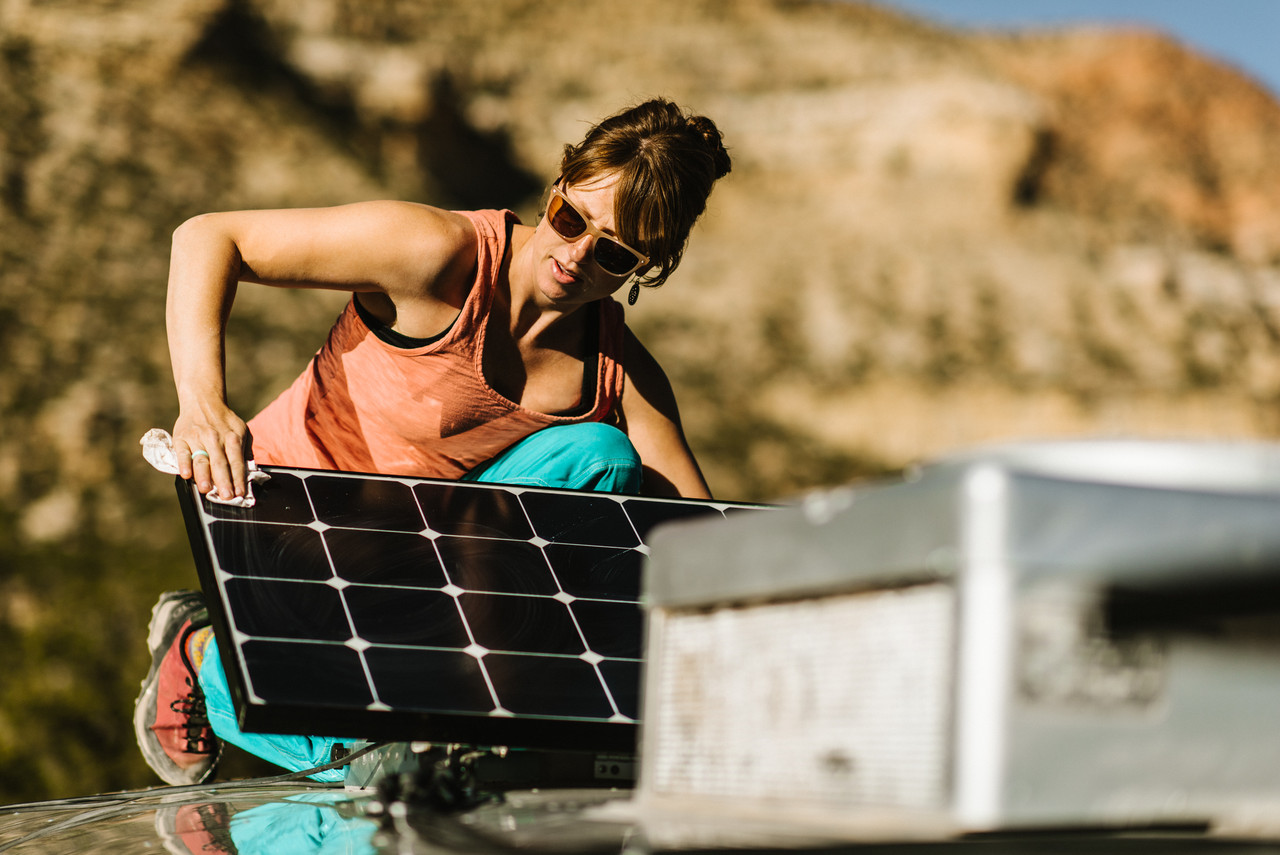Solar Panel Kit Components And Use Cases
If you're new to solar power it can often seem a daunting undertaking. There are a lot of components that make up a solar power setup, all from numerous manufacturers. No matter how much research you do, it's possible you never feel confident in your choices. Solar panel kits can do a lot to reduce the headache of solar panel integration.
The necessary items to create a solar power setup are readily available, and you can even build or install them yourself. Setting up your own solar power system can be a big undertaking, but using solar panel kits makes it far easier than it once was.
Building an entire solar power system yourself takes research and planning, including sourcing the right materials and ensuring they all work together. If you're installing solar power at home, you'll also have to research your town's proper permitting.
Installing solar power is a worthwhile exercise because solar power is one of the best renewable energy options available. Solar is also an investment that pays off long-term in both energy costs and reduced carbon footprint.
This solar panel kit guide walks you through everything you need to know about kits and how they can simplify your solar installation.
What are Solar Kits?
A solar panel kit is a specifically packaged set of solar components which work together to generate and store electricity from the sun. Using a solar energy kit, you can create a seamless renewable energy solution.
Solar kits give you a headstart on your solar installation and take the headache out of ensuring all your components, such as solar panels, charge controllers, cables, and mounting hardware, are compatible.
Using a starter kit helps reduce the amount of individual research you have to do on individual components, so they're great for solar power newbies.Getting components that work together properly can be challenging if you're unfamiliar with the technical side of solar power. Solar panel kits handle this integration for you.
If you're new to the renewable energy scene, solar kits are an excellent option for getting started. There are different styles of kits available for different lifestyle needs, such as RV kits, cabin kits, and marine kits. Since there are so many use cases for solar panels, there is often a kit designed ready-made for your exact use case.
One of the primary benefits of solar panel kits is that they can be tailored to specific niche applications. This flexibility makes solar panels accessible for beginners where choosing the proper components and sizing would be otherwise prohibitive.
A solar kit will often be the quickest way to integrate solar power into your use case. When you get a solar panel kit, the kit will come with everything you need to hit the ground running. At the same time, it's always possible to piece together every component individually.
Is it Possible to Build Your Own Solar Panels?
Of course, solar panels must come from somewhere, so some people are capable of making their own. However, you're unlikely to end up with anything beyond an interesting science experiment. Today's solar panels are manufactured using advanced processes to provide the highest possible efficiency.
It is possible to try and build your own solar panel system, including the solar panels, completely from scratch. However, it can be risky to attempt to make your solar panels, as faulty workmanship could lead to system failure and become a potential hazard.
Putting together your solar power system and actually building a solar panel are two different things. However, choosing the correct components and how to assemble them on your own also presents a potential risk. You could end up damaging your equipment or even injuring yourself.
Solar panel kits take care of the careful selection and sizing process, providing you with the components you need along with clear and safe instructions.
Even if you consider yourself a DIY pro, it can be dangerous for someone with little to no experience in solar equipment to build and install a large system. If you really want to try your hand at making your own solar panels, you should start with a small-scale project, don't attempt a big project like trying to power an entire house.
What to Look for in Solar Panel Kits
The most important thing to look for in a solar panel kit is the overall value compared to your needs. You should be aware that some kits will use lower quality components to reduce the overall cost.
There are many different solar panel kits to choose from, including, small solar panel kitsor kits built specifically for portable use, housing, RVs, and vans, or marine transportation. Not every kit will use the same component list or the same parts.
The capacity and features of solar panel kits can vary widely. While some can provide multi-purpose functionality, others are highly application-specific. Understanding what your needs are is an important part of choosing the right solar panel kits.
Not only do you need a kit that's right for your specific use case, but also one that is properly sized to meet your electrical demand. Sizing is the most important part of finding the right solar power solution, whether you're choosing a ready-made kit or designing a complete solar power system for your home.
It's essential to note every component in the kit to ensure that each one meets the needs of your final use case and that the kit includes every part required for your use case. Investing in a quality kit up-front will pay off in the long term.

Components of a Solar Panel Kit
All solar panel kits include a solar panel or panels, a charge controller, cables, and mounting hardware. If you need to add energy storage to your solar power system, you'll need to purchase batteries separately, which are necessary for anyone who wants to use solar power to go off-grid.
Solar Panels
Image: https://drive.google.com/file/d/1KWXldnh0_W7SKdTe-sL2rogBl7u70HtJ/view?usp=sharing
Solar energy begins with the sun, and every solar power setup starts with solar panels. Solar panels are the technology that takes light from the sun and converts it into energy that can power electrical loads. Solar panels can produce electricity for something as small as your phone, all the way up to supply electricity to residential and commercial buildings.
The solar panels that you receive with your solar panel kit can range widely in their capacity and features. Most kits will range from as few as 100 watts to as many as 800 watts, with anything more than that likely being reason enough for a professional consultation rather than a ready-made kit.
You can even find kits with flexible solar panels that provide more installation options. These are commonly used for RVs and other applications where the panels don't necessarily have a flat foundation. Some panels are even foldable for the highest level of portability.
Solar panels can be monocrystalline, polycrystalline, or amorphous, with most falling into the first two categories.
Monocrystalline means that the solar power cells are each one single crystal, providing exceptional efficiency. Polycrystalline panels contain cells made of several smaller crystals each, which is less expensive to produce but ultimately less efficient. Both can be suitable for various applications.
Charge Controllers
Image: https://drive.google.com/file/d/1qZDY8h4UX6V7AH0QSPbxjmxE0MZxeBwr/view?usp=sharing
Charge controllers are an essential component in a solar setup. Your solar panel or solar array sends direct current (DC) electricity through the charge controller so you can then store it in a battery bank.
Your solar panel kit will come with one of two different types of charge controllers. Pulse width modulation (PWM) charge controllers are inexpensive but inefficient. They lead to some waste from your solar panels, but this isn't significant at low power, such as with a 100-watt panel.
The other type of charge controller is maximum power point tracking (PMMT). These MPPT charge controllers constantly adjust voltage and current to optimize power output from your panels. They're more efficient, but also more expensive. For large solar panel kits, the trade-off in initial cost is often worth the energy sayings.
Battery Banks
Solar battery banks use multiple solar batteries. Banks are usually required if you want to use solar energy to power anything significant, so a solar battery bank lets you take your energy savings and efficiency to the next level. Solar battery banks store power for days when the sun isn't shining or for use in an emergency when grid power gets cut off.
Anyone trying to run their home off of purely solar power will rely on solar batteries for power overnight. Solar kits are often for either portable applications or solely to provide supplemental power, so batteries aren't necessarily needed.
Most solar panels and charge controllers are compatible with regular 12-volt car batteries, which is part of why solar power sees so much widespread use with RVs.
Power Inverters
Image: https://drive.google.com/file/d/1AHJlwTkUmGJgoGKVRCpHhO59bnPi6EDo/view?usp=sharing
In off-grid solar applications, an inverter is usually a necessary component. An inverter draws power from a battery bank, converting Direct Current (DC) into alternating current (AC). The inverter allows even non-DC appliances to use solar energy. Not all solar systems will need an inverter; check the appliance to see which current it uses. Most stationary devices which use electricity directly from an outlet, such as lamps, washing machines, or refrigerators, use AC power.
Off-grid Solar Kits vs. Grid-tied Solar Kits
Solar panel kits are an excellent option for anyone who wants a green, reliable, and constant energy source - without being connected to the grid. When choosing a solar setup you should be aware that there are different considerations for off-grid solar kits compared to grid-tied solar kits.
Grid-tied solar kids need less work to install due to the lower component count. Additionally, they take away any fear that poor weather might leave you without power - since you will still be tied to the legacy power grid.
In some areas, any solar power production that you feed back into the grid can be deducted as a credit from your power bills or even generate a net profit.
Off-grid will require you to have battery storage and the associated components necessary for you to store the energy your solar panels create.Without a connection to the grid, you simply won't have any power aside from that which your solar panels generate.
If hard-line power is not available in your area, or you want to live independently from the grid, then an off-grid solar kit is the only option. Off-grid solar kits are popular with van lifers and homeowners with properties in remote locations, such as a cabin in the woods.
Solar kits are a particularly popular option for very remote sites with minimal power requirements. Gasoline or other fuel-powered generators are bulky and heavy and require regular fuel deliveries to work. While every application is unique, solar panels often present a viable solution where other power sources fall short.

Are Solar Panel Kits Worth It?
Portable solar power kits allow everyday people, with all kinds of lifestyles, to obtain energy independence. Kits reduce the upfront cost associated with going solar and make renewable energy attainable for everyone.
Most people choose to install solar panel kits to reduce their energy costs, reduce their impact on the environment, or both.
There are many different factors to consider when evaluating the long-term value of solar panels. The immediate expense might seem high, but this must be compared with energy savings and potential tax incentives as well.
Electricity is one of the most expensive utility costs. Using solar drastically reduces your electricity bill; even if you don't produce all of the energy you consume, using even some solar energy will reduce your utility bills, and you'll still save money.
Investing in a solar panel kit and installation comes with initial upfront costs. But, you'll save on your energy bills every month after the initial installation. By installing solar using a kit, you can shave off some of the solar system's initial installation costs.
Solar kits are easy to upgrade in the future if you decide to add more panels and power-generating capacity. These kits are now also considerably cheaper than they were a decade ago due to advances in technology and increased adoption.
Solar panel efficiency varies depending on the weather and amount of sunlight in your region, and what kind of home or vehicle you need to power. However, many solar users quickly see a positive return that more than justifies the investment in a solar panel kit. You'll also be future-proofing your ongoing utility costs and protecting against unpredictable increases in electricity costs.
Many state, government, and utility organizations offer further financial incentives to encourage the continued expansion of solar power use across America. Solar tax breaks and other financial incentives are available to make solar more accessible for homeowners. Depending on your location, the available solar incentives could reduce your solar panel system's net cost by anywhere from 26 to 50 percent.
Installing solar energy in your home can also increase its value. Many property buyers value solar energy as a central selling point because of the potential for reduced electricity bills and a smaller carbon footprint.
As well as being cost-efficient, solar power is a renewable energy source that delivers positive environmental impacts. Solar energy systems don't produce air pollution or greenhouse gases. Solar also contributes to America's energy independence and provides more jobs than the coal or upstream oil & gas sectors in the United States.
Solar power kits are definitely worth the initial investment, both in monetary savings and the knowledge that you're reducing carbon emissions. With the increased availability of solar kits, switching to solar energy isn't as scary, expensive, or complicated as it once was.
How to Choose the Best Solar Panel Kit
The best solar panel kit is the one that best suits your use case for a given investment.
To determine which kit and how many solar panels you will need, you should first understand your energy needs. The amount of energy you require will determine what size of solar panel kit you require.
Solar panel kits are created to suit your lifestyle and energy needs. So, start by figuring out how much energy you plan to use on average per month. Next, work out how much sun exposure time you can expect throughout the year - this will differ between locations. Our Solar Calculator will help you find out this information so you can make a well-informed choice.
Once you know your expected energy use and potential to generate the energy, you will have a better idea of your kit needs. Understanding your expected energy consumption will help you choose the solar kit that makes the most sense for your situation.
One essential point to keep in mind is the distinction between average energy use and peak energy use.
Something like a microwave can draw 1000 watts of power but might only be used for a minute each day. A light bulb, on the other hand, could be on for hours at a time, although it draws less power. Finding the balance here can be the most difficult part of choosing your solar panel kits.
Premium solar kits are great for those who prioritize efficiency and reliability. But if you live a mobile lifestyle in an RV or van conversion and are out on the open road, you should use smaller solar panel kits specially built for RVs and vans.
If you want, or need to, live entirely off-grid in your home or cabin, then a cabin solar panel kit is a good choice.Of course, batteries are going to be a significant factor to consider when going with a purely off-grid solution.
Some components are worth paying more for, especially if you need a reliable energy source. Using kits with the best solar panels is more desirable than kits with lower-quality panels and will pay off in longevity and reliability.

Solar Panel Kits For Your Home
Home, cabin, or tiny home solarkits provide an independent power source away from the grid. If you want or need to power your home by solar panel alone, Renogy's off-grid kits come with everything you need to power up your home or cabin. These home solar panel kits also make great additions to tiny houses, sheds, or other large-scale remote systems.
Renogy Cabin Kits come with either 270W Polycrystalline or 300W Monocrystalline panels. They also include the necessary components to connect the panels to the controller and the controller to the battery bank. However, You will still need a battery bank and an inverter if you want to run AC appliances.
If you're wondering how many solar panels you need to run a home, you're not alone. As a rough guide, houses in the US use an average of 10,400 kWh of electricity per year. If you install a 250-watt solar panel, you're looking at needing around 28-34 solar panels to create enough solar energy to power an entire home. However, many homes, tiny homes, or cabins are smaller than average or have lower energy needs.One of the most significant factors here will be your use of heating and cooling appliances. Running electric heat or air conditioning will almost always be the largest individual factor when determining your energy use.
RV Solar Panel Kits
RV Solar Panel Kits are the best kit for anyone who wants to use solar power in an RV, motorhome, or mobile application. These RV solar kits come equipped with the components you need for on-the-go projects. The kits include a flush mount charge controller and a cable entry housing unit.
Your RV is already set up to run its internal appliances and amenities off of a standard 12-volt battery. Adding a solar panel kit to your RV simply reduces your reliance on external generators, powered camping sites, or the RV's own fuel.
When choosing solar panel kits for your RV, there's more to think about than just capacity. You'll also need to find solar panels that are durable and up to the test of taking on the open road. Renogy solar panel kits feature rugged but lightweight aluminum frames that provide effective protection for your solar panels.
The low maintenance requirements of solar panels also lend them to use with RVs. If you're considering a conventional generator for a long trip, you need to make sure to keep up with lots of maintenance requirements to make sure it's working. Solar panels, on the other hand, require little maintenance aside from the occasional cleaning.
Using a kit takes all the guesswork out of starting your RV solar adventure. These solar panel kits are easy to install and simple to use. Using solar power in your vehicles allows you to travel freely off-grid and without the need for noisy generators.
Marine Solar Panel Kits
Image: https://drive.google.com/file/d/1vSCXMb0znrOoHYekFRpQ9M2cE9oapw9J/view?usp=sharing
Marine solar power kits allow you to spend more time out on the ocean. Consider a Renogy solar kit, our marine solar panel kits are suitable for various aquatic transportation forms, including speedboats, motorboats, houseboats, and pontoons.
Marine solar panel kits are simple to use and easy to install and come with power ranges from 100W to 350W. Marine kits specifically accommodate marine spatial requirements, which are often limited.
Before you choose a marine solar kit, you will need to define what your electricity needs are. They might be as simple as keeping the battery topped off while the boat is on a mooring or just supplementing the current power generation capability. They can be as complex as using solar power to be fully self-sufficient - generating all the power needed on passage and anchor.
Next, do a complete audit of your onboard power usage. Consider how big the boat is, your crew's size, your cruising grounds, sailing/motoring preferences, onboard hobbies, the number and type of appliances onboard, such as a refrigerator, and freezer, whether you use LED lights, etc.
Calculate how much power you use but adding up the watts that each of your electrical devices draws and how much you expect to use them. Once you've figured out your power usage, you can work out your solar power demand and choose a suitable kit and marine battery if you want to store power.
If you're new to solar energy, then the logistics of adding solar panels to your boat may seem overwhelming at first, but it doesn't have to be an intimidating process. Marine solar panel kits serve as an easy and space-efficient battery maintaining solution for life on the water. You can keep your electronics powered and enjoy your time in the water a while longer!
Find Your Perfect Solar Kit Today
Renewable energies have so many benefits both financially and environmentally. Solar panel kits make those benefits tangible to a broader range of people regardless of lifestyle.
Whether you want to try out vanlife, take your home off-grid, or hot the ocean for weeks at a time, solar kits can help make your dreams of energy independence become a reality. Explore the Renogy range of high-quality solar kits and our collection of sun-powered products.
Resources:
https://news.energysage.com/solar-panel-kits-for-sale/
https://solar-us-shop.com/blogs/solar-blog/solar-kits-the-best-way-to-power-your-life-with-the-sun
https://goingsolar.com/solar-panel-kits/
https://www.dlight.com/blog/the-pros-and-cons-of-solar-power-kits/
See other related articles at Renogy:
Solar Panels Maintenance Best Practices And Costs
A Guide to Installing Solar Panels On Van Or RV
Solar Panels 101: A Beginner's Guide
The Ultimate Guide To DIY Off-Grid Solar Systems
Do solar panels increase home value
How efficient are solar panels
How Many Solar Panels Do I Need








